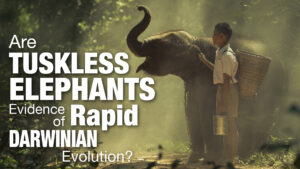Are Tuskless Elephants Evidence of Rapid Darwinian Evolution?
Are Tuskless Elephants Evidence of Rapid Darwinian Evolution?
According to the recent research of Princeton University evolutionary biologist Shane Campbell-Staton and his colleagues (published in Science magazine in October1) ivory poaching has caused the “rapid evolution” of African elephants. Elephants with tuskless genetics have become more typical among the species. Is the proliferation of elephant tusklessness evidence of Darwinian evolution?
While various forms of evolution have been promoted for millennia,2 Charles Darwin’s version included a new feature: natural selection. Natural selection is the idea that “nature” selects the best “fit” organisms for survival, while those less suited for an environment, if they do not migrate, will tend to die off.
So, if a particular variety of finch or English Peppered Moth is more suited to an environment than another variety, the better suited option will tend to survive and propagate its genes, while the less suited species will tend to eventually die out, along with its “inferior” genes.
Natural selection is, by and large, a reasonable idea and does not contradict biblical Creation. Natural selection does not, however, actually change an organism. It does not have the capability of changing a single-celled organism into a human over time, as Darwin theorized it could. In the well-known words of Dutch botanist and geneticist Hugo de Vries, “Natural selection may explain the survival of the fittest, but it cannot explain the arrival of the fittest.”3
How, then, does the new, “more fit,” variety come about? Princeton University evolutionary biologists Peter and Rosemary Grant spent over 35 years studying Darwin’s famous Galapogos finches. As we have discussed elsewhere,4 Darwin noted how different shapes and sizes of beaks in finches may have contributed to the survival and flourishing of various bird varieties and the extinction of others. But where did the beak shape and size variety originate? As high school Biology textbooks correctly teach, the Grants found that “for beak size and shape to evolve, there must be enough heritable variation in those traits to provide raw material for natural selection.”5
“Heritable variation” refers to genetic variety that can be inherited from parents and expressed in the species’ offspring. In other words, parents already have the genetic variety in their genes which is then expressed in their offspring. If that potential for variety did not already exist in the genes of the parents, that variety could not be expressed in an offspring. “Without heritable variation in beak sizes, the medium ground finch would not be able to adapt to feeding on larger, tougher seeds during a drought.”6
Now to the point: elephants, along with any species on the planet, have a tremendous amount of genetic potential for variety in their offspring. Some elephants have “tusk genes” and are able to grow tusks, while the other elephants have “tuskless genes.” If poachers target elephants with tusks, obviously the elephants with tusk genes are going to tend to die out, along with the tusk genes that they have.
In the meantime, the elephants with tuskless genes will tend to survive and begin thriving. The population of African elephants (and the genes they possess) will shift to predominantly tuskless, which is what scientists are finding. But did African elephants evolve?
Well, it depends upon your definition. Did the overall population of the African elephant change (“evolve”) from predominantly tusked to tuskless? Yes. Was the change Darwinian (i.e., the kind of change that could allow an elephant to grow new components and turn into something else)? No.
New genetic information is required in order for a species to evolve across a phylogenic boundary into a totally different kind of species,7 and no new genetic information was introduced to the species (and there is no known natural mechanism for the generation of new genetic information8). Instead, already existing genetic information was simply expressed more often among the elephants.
Here are three key takeaways from the tuskless elephant study:
- Are tuskless elephants still elephants? Yes. They have not evolved into something else, nor will they do so given enough time.
- Has new genetic information spontaneously generated (or been created by random genetic mutations) as tuskless African elephants have begun to gain dominance? No. The genetic information already existed.
- Has progressive evolution happened? No, and, in fact, de-evolution has occurred since the tusk gene has diminished in the African elephant population (i.e., genetic information is being lost). While tuskless elephants can more easily survive death by poachers, overall tuskless elephants will be more vulnerable to other predators in the wild.
Variety among species exists. Some varieties thrive in certain environments/situations. If, however, distinctions in species must come from the genetic variety of their ancestors, where did the original genetic information originate? That’s the more important question. If the origin of information is always the product of a mind, then the genetic information for the tusks of the African elephant originated from a powerful Mind that created it.
Endnotes
1 Shane C. Campbell-Staton, et al. (2021), “Ivory Poaching and the Rapid Evolution of Tusklessness in African Elephants,” Science, 374[6566]:483-487.
2 Bert Thompson (1981), The History of Evolutionary Thought (Montgomery, AL: Apologetics Press).
3 Hugo de Vries (1905), Species and Varieties: Their Origin by Mutation, ed. Daniel Trembly MacDougal (Chicago, IL: Open Court), pp. 825-826, emp. added.
4 Kyle Butt (2006), “What Do the Finches Prove?” R&R Resources, 5[9]:33-R, https://apologeticspress.org/wp-content/uploads/2021/08/0609.pdf.
5 Kenneth R. Miller and Joseph S. Levine (2010), Biology (Boston, MA: Pearson), p. 472, emp. added.
6 Ibid., p. 473, emp. added.
7 Jeff Miller (2014), “God and the Laws of Science: Genetics vs. Evolution [Part 1],” Reason & Revelation, 34[1]:2-20, https://www.apologeticspress.org/APContent.aspx?category=9&article=4779&topic=296.
8 Ibid. Cf. Jeff Miller (2014), “God and the Laws of Science: Genetics vs. Evolution [Part 2],” Reason & Revelation, 34[2]:14-21, https://apologeticspress.org/god-and-the-laws-of-science-genetics-vs-evolution-part-2-4788/.

REPRODUCTION & DISCLAIMERS: We are happy to grant permission for this article to be reproduced in part or in its entirety, as long as our stipulations are observed



0 Comments:
Post a Comment
<< Home